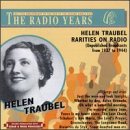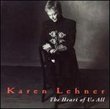| All Artists: Traubel Title: Traubel Rarities on Radio Members Wishing: 0 Total Copies: 0 Label: Enterprise Release Date: 5/23/1995 Genres: Special Interest, Pop, Classical Styles: Vocal Pop, Opera & Classical Vocal, Ballets & Dances, Waltzes, Chamber Music, Historical Periods, Baroque (c.1600-1750), Modern, 20th, & 21st Century, Symphonies Number of Discs: 1 SwapaCD Credits: 1 UPC: 723722096723 |
Search - Traubel :: Traubel Rarities on Radio
 | Traubel Traubel Rarities on Radio Genres: Special Interest, Pop, Classical
|
Larger Image |
CD DetailsSimilar CDs
|
CD ReviewsA wonderful recording BDSinC | Calgary, Alberta, Canada | 07/25/2005 (5 out of 5 stars) "This is truly a wonderful document of this singer's talents. Before talking about the recording itself, it has to be said right out that the transfers were not that great, the sound is sort of "boxy" and well, it does sound like something old and from an ancient and dingy era. That said, it does give a great deal of pleasure. It must be remembered that although Traubel was noted for her singing of Wagner, she loved to sing show tunes and also in nightclubs. For most of us, that sounds super strange as it is obvious from her Wagner recordings her voice is super huge and well suited to opera.
Obviously, the radio people knew that she was liked by the public and used her for the purpose of entertaining others. One must NEVER see her presentation as pandering down to the masses, for she never does that, even if she is singing music the public may like. Each piece is sung well, in tune (not as some have said, like a recording played at the wrong speed), and in her very well prepared way. She sings with the talent she has. Unlike a later singer who would excel in both opera and blues, Eileen Farrell, Traubel does not have an "opera voice" and a "popular voice." While Farrell did sound almost like a different singer when singing the two types of music, diction and all perfectly atune to what she was singing, and never crossing one type of singing into the other, Traubel is more like the "modern operatic crossover singers" (Domingo, Cararrass, etc) we hear today. She sings what she sings with a very obviously "operatic studied sound." Once you get over that fact, what she does is really quite lovely. Obviously, since she was popular on the radio, audiences of that time really didn't mind hearing that "cultured sound" when listening to popular music they enjoyed. Maybe that is because even Broadway at that time required the voice to be produced naturally and didn't rely on mikes as it does today to make its impact. Her selection of music is quite unusual, for she doesn't confine herself to music written for the female voice (I won't even say the Soprano voice, for she even sings music for Contraltos). The notable pieces for male voice are "Oh What a Beautiful Morning", "Yours is My Heart Alone" (Land of smiles), and "Stout Hearted Men." The first is forever in our minds as sung in the MGM movie adaption of Oklahoma (which Shirley Jones, though I believe McRay sings the piece), every operatic tenor imaginable singing the piece from Land of Smiles, and well, Nelson Eddie doing "Stout Hearted Men." How does Traubel fair singing those "Male Leads?" Well, not bad at all. She makes no attempt to be "manly" (and we are all glad for that) and just lets her own love of the music shine through. Her diction in English is exceptional. Her renditions of many English songs (Greensleeves, The Lord's Prayer, and the Lost Chord) are all well sung with excellent diction, and she is actually convincing in the later which is written for contralto. Yet, one is left wondering what is missing in all of them. To me, the real thing missing in these arrangements, and in her performance of this music, is the fact her huge voice really has nothing to do. It sings the music, but that is about all. The music just doesn't give her room to shine. Her "Adios Grenada" is wonderful, charming, and touching. I first heard the piece sung by Caballe, and I have to admit, I much prefer her singing of this piece (which could be also because she speaks Spanish as her native tongue), yet, Traubel handles the delicate touches of the music just wonderfully, and with more finesse than I thought possible in such a huge voice. Once we get to the operatic numbers we hear Traubel as we expect to hear her, once again with all the force, power, ring, and well, excitement she puts into her operatic roles. She may have loved to sing all sorts of music, but whether she liked it or not, her real forte was opera, and most especially grand opera for a large grand voice. That is where she was allowed to be her complete self. Sadly, she never figured that out. If she had, maybe she would have given up singing in nighclubs, for she would have realized her voice, as much as she loved the music she would sing in a club, just didn't serve that music well. And conversely, that music didn't serve her voice well. In spite of the poor quality of the recording, it is still quite wonderful to listen to, and gives great pleasure at every turn. It also shows us what this woman was all about as far as her talents were concerned and as far as she saw them. Seldom do we get to hear an operatic singer singing popular music on the same disk she sings opera. Here we get to, and well, I would say, she was definitely an opera singer par excellence, and a very good and enjoyable popular singer but sadly not anywhere near on the level her operatic singing was. A super recording for anyone really interested in this singer and what she had to offer us. Sadly, she didn't record much, so buying everything you can that she did record is necessary to form a true opinion of her incredible talent, must too underrated and far too seldom appreciated in her day and even in ours." |

 Track Listings (15) - Disc #1
Track Listings (15) - Disc #1